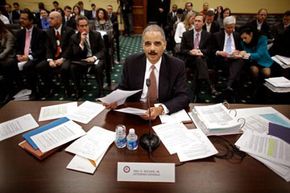In 2008, Barack Obama was elected as the first African-American president of the United States of America. In keeping with his historic campaign and election, Obama nominated Eric Holder to serve in his Cabinet as the United States attorney general. Holder's career, like Obama's, is full of a history of African-American firsts. Holder was the first African-American to serve as the U.S. attorney for Washington, D.C., and the first African-American to be deputy attorney general. As attorney general, he was also the highest-ranking African-American person in law enforcement in the United States.
Holder's position in the government is obviously an important one. As attorney general, Holder guides the world's largest law office and leads the agency responsible for enforcing federal laws.
Advertisement
The attorney general is the legal adviser to the government. On the federal level in the United States, the Office of the Attorney General heads the Department of Justice and is the chief law enforcement office in the federal government. The attorney general is responsible for legally representing the United States and advising the president and heads of executive departments when his or her opinion is needed. The attorney general also may appear before the Supreme Court.
In addition to the U.S. attorney general, there are attorneys general in each of the 50 states. They serve as legal adviser for their states' governments and as their states' chief law enforcement officer. In some states, the state attorney general, like the federal attorney general, is the head of the state department of justice.
Advertisement


